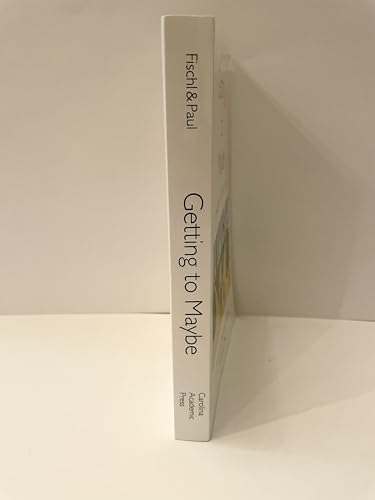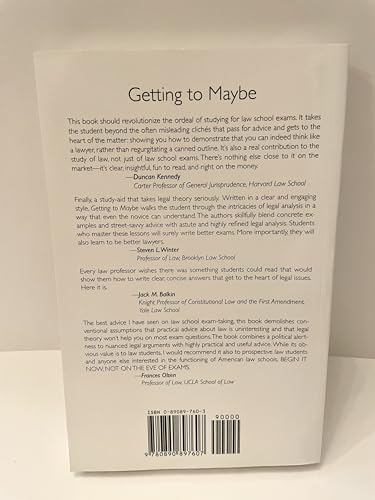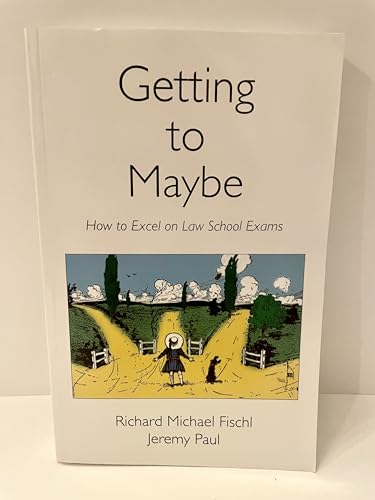Customer Services
Copyright © 2025 Desertcart Holdings Limited







Getting to Maybe: How to Excel on Law School Exams [Richard Michael Fischl, Jeremy Paul] on desertcart.com. *FREE* shipping on qualifying offers. Getting to Maybe: How to Excel on Law School Exams Review: Excellent book, not only for lawyers or law students - To begin with, I am neither a lawyer, a law student, nor even a prospective law student. I am, however, someone who has always been interested in the law, primarily for two reasons. First, the law is the principal formal means a society uses to try to resolve conflict among the society's members. Second, and closely related to the first reason, the sum shape, both of content and procedure of the law, is an expression of exactly what a society's values are and the goals a society sets for itself or the standards by which it ideally wishes to be judged. I found this book to be excellent, informative, well written, and even at parts entertaining. Although meant as a guide for law students to use to prepare for the strenuous exams that are associated with each course they will take in law school, the book provides much, much more, and hence my belief that it can profitably be read by a far larger readership than its ostensible audience. One of the key elements stressed throughout, and exemplified by numerous enlightening examples, is that there usually is no one correct answer to any given legal question. Arguments can be made on at least two sides of any matter based upon, for example, a "plain reading" of the text of a relevant law and the reasonably understandable intent of those who made the law (e.g., a legislature). The authors bring out clearly such sources of legal precedent as laws, government regulations, individual case law decisions by judges, common law, government policy, and specific codes (e.g., the Uniform Commercial Code, or UCC) and show how differing results to a case can readily come about based upon arguments using the different sources to bolster respective cases. In reality, although by minimal definition a book designed, as said above, to prepare for the taking of law school tests, the book actually also is a good guideline on how to think (not necessarily what to think) about many larger issues in society, including politics and policy issues of all sorts. Finally, the first two thirds of the book discuss ways to think about the wide range of questions that can be posed to aspiring lawyers and introduces the reader to understanding such distinctions as "forks in the law" and "forks in the facts" (a quite useful distinction to keep in mind). The final part of the book provides solid test taking strategies that are applicable to a wide range of academic testing (e.g., answer the question the professor actually asked and avoid wasting time or effort on ancillary matters not really germane to helping to resolve the issue.) Although some of these may seem obvious once read, the tips are the type of thing that, under pressure of exams, many students often forget to apply. In sum, I highly recommend this book to those interested in life in the modern world. Review: Must read for 1L or Incoming Law Student! So helpful!!! - Any 1L or incoming law student needs to read this book! So, I took the BARBI Law Preview before law school began to get an overview of what law school was like and a heads up on how to do things. During this program I had read just two chapters of the book- and these two chapters alone put me in a crucial mind frame to understand the importance of what your professors are looking for. It is not just about distinguishing the right issues and facts, because there is truly no such thing, but distinguishing both sides of an issue, and of course you have to read the book to get more info, but I feel like it has helped me understand what success sounds like in exams. I am only going into my third week of 1L, but I can tell the book has given me a leg up. I recommend that you read this book before you start, or in the first two weeks (though you'll be burdened with a lot of reading then- so before is best) so you can get into the mindset, instead of doing it right before exams and feeling like you have to rewire your brain to everything you thought you understood. I guess I'll have to update you guys once I see my exams, but so far so good!
| Best Sellers Rank | #56,882 in Books ( See Top 100 in Books ) #10 in Legal Self-Help #16 in Law Practice Reference (Books) #261 in Study Guides (Books) |
| Customer Reviews | 4.6 4.6 out of 5 stars (682) |
| Dimensions | 5.25 x 0.75 x 8.25 inches |
| Edition | 1st |
| ISBN-10 | 0890897603 |
| ISBN-13 | 978-0890897607 |
| Item Weight | 1.1 pounds |
| Language | English |
| Print length | 348 pages |
| Publication date | May 26, 1999 |
| Publisher | Carolina Academic Press |
T**R
Excellent book, not only for lawyers or law students
To begin with, I am neither a lawyer, a law student, nor even a prospective law student. I am, however, someone who has always been interested in the law, primarily for two reasons. First, the law is the principal formal means a society uses to try to resolve conflict among the society's members. Second, and closely related to the first reason, the sum shape, both of content and procedure of the law, is an expression of exactly what a society's values are and the goals a society sets for itself or the standards by which it ideally wishes to be judged. I found this book to be excellent, informative, well written, and even at parts entertaining. Although meant as a guide for law students to use to prepare for the strenuous exams that are associated with each course they will take in law school, the book provides much, much more, and hence my belief that it can profitably be read by a far larger readership than its ostensible audience. One of the key elements stressed throughout, and exemplified by numerous enlightening examples, is that there usually is no one correct answer to any given legal question. Arguments can be made on at least two sides of any matter based upon, for example, a "plain reading" of the text of a relevant law and the reasonably understandable intent of those who made the law (e.g., a legislature). The authors bring out clearly such sources of legal precedent as laws, government regulations, individual case law decisions by judges, common law, government policy, and specific codes (e.g., the Uniform Commercial Code, or UCC) and show how differing results to a case can readily come about based upon arguments using the different sources to bolster respective cases. In reality, although by minimal definition a book designed, as said above, to prepare for the taking of law school tests, the book actually also is a good guideline on how to think (not necessarily what to think) about many larger issues in society, including politics and policy issues of all sorts. Finally, the first two thirds of the book discuss ways to think about the wide range of questions that can be posed to aspiring lawyers and introduces the reader to understanding such distinctions as "forks in the law" and "forks in the facts" (a quite useful distinction to keep in mind). The final part of the book provides solid test taking strategies that are applicable to a wide range of academic testing (e.g., answer the question the professor actually asked and avoid wasting time or effort on ancillary matters not really germane to helping to resolve the issue.) Although some of these may seem obvious once read, the tips are the type of thing that, under pressure of exams, many students often forget to apply. In sum, I highly recommend this book to those interested in life in the modern world.
A**R
Must read for 1L or Incoming Law Student! So helpful!!!
Any 1L or incoming law student needs to read this book! So, I took the BARBI Law Preview before law school began to get an overview of what law school was like and a heads up on how to do things. During this program I had read just two chapters of the book- and these two chapters alone put me in a crucial mind frame to understand the importance of what your professors are looking for. It is not just about distinguishing the right issues and facts, because there is truly no such thing, but distinguishing both sides of an issue, and of course you have to read the book to get more info, but I feel like it has helped me understand what success sounds like in exams. I am only going into my third week of 1L, but I can tell the book has given me a leg up. I recommend that you read this book before you start, or in the first two weeks (though you'll be burdened with a lot of reading then- so before is best) so you can get into the mindset, instead of doing it right before exams and feeling like you have to rewire your brain to everything you thought you understood. I guess I'll have to update you guys once I see my exams, but so far so good!
I**9
Must-Have for Law Students
This is a good book. A lot of the trouble with law school exams is law professors are notoriously bad teachers, and these bad teachers write bad exams. Granted, this is a worst-case scenario, but if you've been to law school for more than one semester, there's a good chance that at least one of your professors has utterly bamboozled you into how he/she wants the final written. So what this book does is give you something of a blueprint and a method of examining fact patterns and exploring the question(s) so that you can simply go into the exam and take it without much fear. Where the book fails to be of help though, is with the IRAC method. I wholeheartedly agree that IRAC is a too-constrictive method of writing that tends to inhibit most students from really expressing what they know. Law professors largely want a mechanical recitation of rules followed by mechanical analysis, so law students spend hours and hours memorizing rules with the ultimate purpose of using them in an IRAC format. It's absurd, but that's the way it is. And this book simply dismisses the fact that lazy law professors love IRAC for the fact that it gives them a template from which they can read and score exams quickly. But still, you can construct an IRAC using this method, it just doesn't lend itself seamlessly to it, which is pathetic--not with respect to GTM, but to the teaching and testing methods used by professors. If you don't believe me, and if you haven't already done so, go look at model bar answers from your state and see if they employ a rigid IRAC formula. They don't. And so to me, that's what this book was good for--being able to write bar exam quality answers that leave room for a different writing styles and methods of analysis. If you're just starting law school, buy this book. If you're already in and still struggling, buy this book. If you're the king or queen of fastidious, multiple, anally retentive headers on your exams, read this book and go look at bar answers.
A**A
The ONLY MARKET-AVAILABLE "ISSUE-IDENTIFICATION" book!!!
I purchased it twice: the first time in the law school, but I had misplaced it in the school library & lost it. The second time: while preparing for a BAR exam, I have realized that I material, but I was still missing issues. The book helped. Also, I did not get it on my first read & deeply dissatisfied. But, upon reading the second time & reading it later, I have gotten the point completely. The book helps to formulate what the issues are & you have to understand how to "uncover" the issues prior to formulating the issues. The book helped again.
W**Y
A well-known book about law school exams but also about how lawyers argue cases.
P**.
Exceptional price on an invaluable book heading into law school.
E**Z
This book accurately describes how law school exams work and is applicable to Canada. I recently finished Canadian law school and recommended this to anyone I know who was recently admitted.
A**R
Would probably be better read a short way into 1L, rather than beforehand - many of the examples and suggestions assume a working background of some concepts and topics that very few 0Ls will have any idea of. Book itself is thorough, almost to the point of redundancy, with a breezy, conversational tone. My biggest gripe is the lack of examples. The book's subtitle is 'How to excel in law school exams', but the main focus is on how to do well. I was rather hoping for suggestions of 'a C answer would go like this, a B answer like this, which would differ from the excellent A answer which would do this'. By lacking a contrast (I believe there's a single, early example of a paragraph answer which would get a pass), the book gives you things to think about to do well, but doesn't really help you move from one level to another.
M**C
This book helped me immeasurably in law school. Highly recommended! 1Ls - read this before you write your first set of exams!
Trustpilot
2 months ago
3 weeks ago